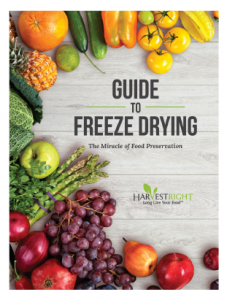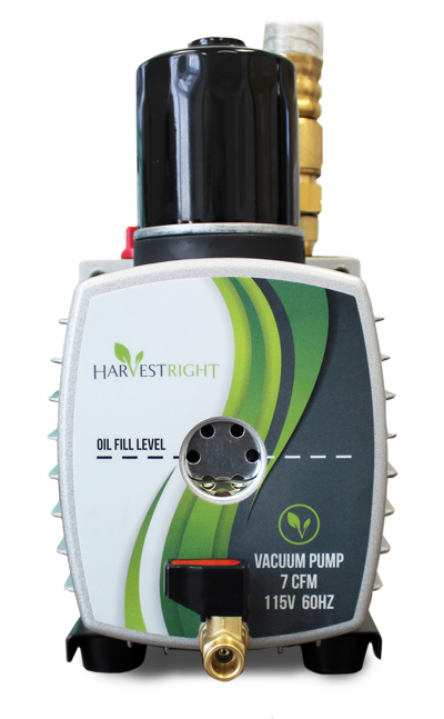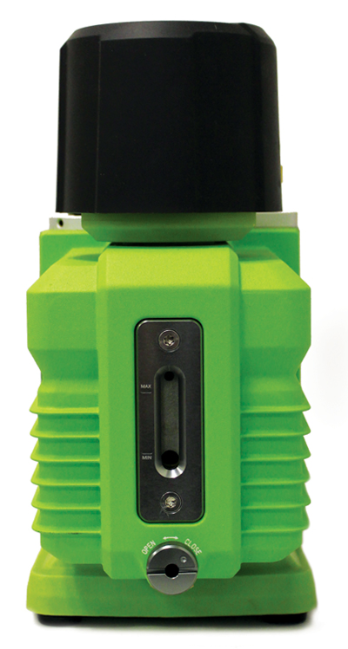
Freeze-dried dairy products are some of the most versatile ingredients you can have in your pantry. Dairy is not only easy to freeze dry, it’s easy to rehydrate and use in recipes. For example, yogurt is high in protein, so adding it to your breakfast oatmeal adds to the nutritional content. Yogurt drops are a big favorite among our customers, and if you haven’t yet had freeze dried ice cream you need to go do that right now.

To freeze dry dairy products such as sour cream or yogurt, spread a thick, even layer on a freeze drying tray. You can also freeze dry milk – when ground to a powder it makes recipes such as cakes extremely moist. When you’re ready to rehydrate freeze dried dairy, just add water gradually and stir until it returns to its original state. If you’re freeze drying ice cream sandwiches, no need to rehydrate. Just eat them as a crunchy snack. Or, powder them up in a food processor and add them to another recipe to get a delicious ice cream flavor.

Sliced and grated cheese can also be freeze dried. To rehydrate, you can easily toss it on top of your casserole dish, cover with tin foil and it will rehydrate from the moisture in the other food. Or, you can spritz it with a little water or even add water to it and warm it up in the microwave to get melted cheese. If you want to rehydrate sliced cheese, put it in a ziplock bag with moist towel until it returns to its original consistency. Freeze dried cheese is delicious on its own, but it’s wonderful to have on hand for pastas and casseroles.

To freeze dry raw eggs, whisk them before pouring onto a freeze drying tray. Freeze dried eggs will powder really easily and to rehydrate, just add water. You can also make delicious scrambled eggs and freeze dry them. Try adding cheese or bits of ham and you can easily reconstitute later with a little water in the microwave or in a skillet on the stovetop.
Dairy products have a short shelf life in your refrigerator – but if you have a home freeze dryer, you’ll not only reduce food waste, you’ll increase the versatile ingredients in your long-term food storage.





Can you freeze dry milk and if so how well does milk freeze dry?
Yes! Milk freeze dries great. It turns into a true milk powder that can then be easily rehydrated.
If powered milk is already in a dry state how and why would you freeze dry it?
Can you freeze dry a full fat heavy cream? Will it rehydrate creamy and smooth, or like broken fat lumps? Finally, if properly stored with oxygen absorbers, what’s the shelf life of pure freeze dried heavy cream? Thanks!
Waiting on a response to this question as well.
Can You Freeze Dry Heavy(Full-Fat) Cream……?
Heavy cream is a short-term storage freeze-dried food. The oil/fat content is so high it tends to have a oily feel to it once freeze dried and is not something that would work for long-term storage.
What is the ratio of water to powder to rehydrate milk?
1 to 1 ratio of water to powder.
Is that by volume or by weight?
Can you freeze dry buttermilk?
Yes, you can freeze dry buttermilk!
Thank you! What about heavy whipping cream?
Heavy cream is a short-term storage freeze-dried food. The oil/fat content is so high it tends to have a oily feel to it once freeze dried and is not something that would work for long-term storage.
do the Freeze Dryers come with instruction booklets for freeze drying times and reconstitution instructions?
Yes, you get an Owner’s Manual and a Starter Guide with your freeze dryer purchase, which gives you some instructions as to how to begin freeze drying. There are also a lot of online resources that can help determine a good range of what to expect for different foods. It’s hard to give one specific dry time/reconstitution method for every single food because there are many variables that can impact it – there is not typically just one clear-cut answer. But, for example, the default dry times that are built right into the freeze dryer work for most foods. Just check the food at the end of each batch to test its dryness then decide if you are ready to defrost the freeze dryer or if you need to add more dry time. You will see that a lot of the learning happens naturally as you start using your freeze dryer.
Should I expect to waste some food during the learning process?
If I only use my freeze dryer once a week, would I ever need to defrost it?
I would not expect to waste any food at all. The freeze dryers are very easy to use. If you use it once a week you will never need to defrost. The defrost is only needed for back to back batches.
I freeze dried potato salad. The potatoes were dry and crisp as they should be. However the remainder was an oily globby mess. So do not freeze dry heavy cream. Too much oil. Nothing with lots of fat and oil will work well.
Can we freeze/dry kefir? Kefir is like a yogurt drink, e.g. thick like buttermilk.
Yes, I’ve seen where a lot of people have done it successfully.
does 1 gallon of milk freeze dried make alot less reconstituted milk? the powder produced seems less than a gallon of milk.
No, the ratios stay the same. If you freeze dry a quart of milk, just reconstitute to a quart size. It’s easy if you store the freeze dried milk in, say, a quart size jar. Then just add water to fill the quart.
Should I vacuum seal my jars of freeze dried milk or will it store fine with just a lid and not sealed?
For longer storage than a few weeks you will definitely want to take the oxygen out. Vacuum sealed with an o2 absorber is best.
Can you freeze dry rice milk???
I have never tried it but it should not be a problem at all since rice freeze dries wonderfully.
I have a freeze dryer and love it. I have dried lots of raw eggs. I have looked and looked for how much water to add to my 2 Tablespoons of egg to make 1 egg. No answer to be found. They all say just add water. I know that HOW MUCH WATER though?? Please help me, sometimes I would like to add an egg to a recipe I can’t leave to liquid the same though
Do you have a scale at home? You could try weighing your tray with the fresh eggs on it, and write down the number of eggs you have on the tray. Then, dry the tray, and weigh the tray when it is done, before you take off the dried eggs. Then subtract the weight of the fresh eggs from the weight of the dried eggs, and divide that weight by the total number of eggs you had on the tray. This will be the weight of water that was originally in each egg that was lost. You should be able to add that amount of water to each egg to reconstitute it. Water is 1 g per mL at room temperature. Then you can use 1 Tbs of water = 15 grams of water to convert to tablespoons of water to add per egg. I hope this helps.